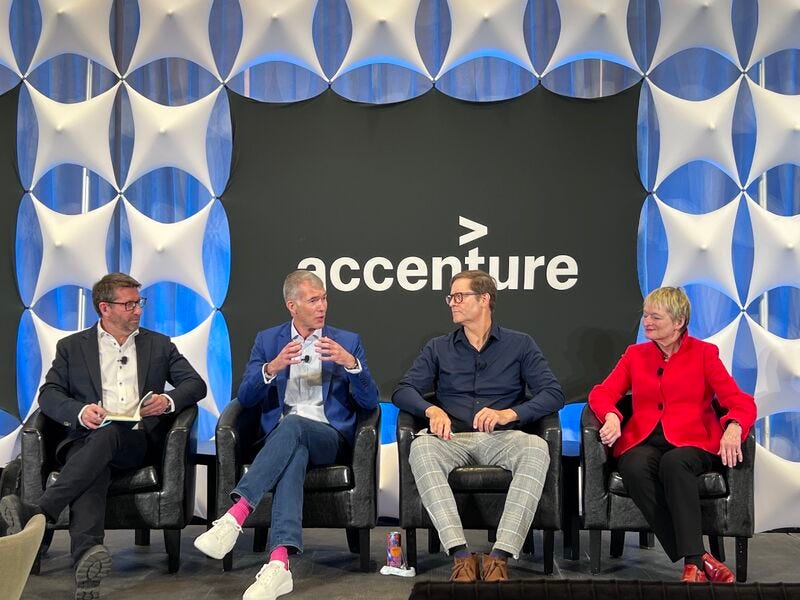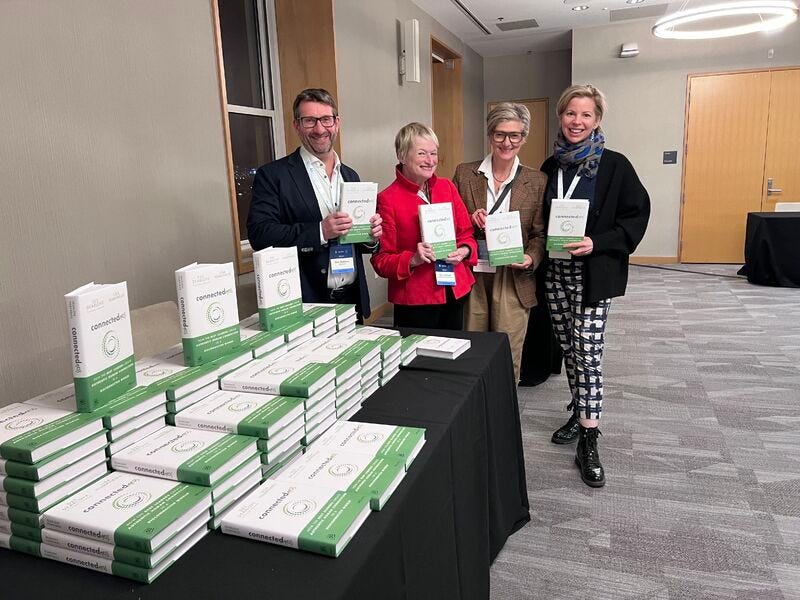“It’s as though the Albanian army was going to take over the world”
Where better to learn about the potential and the pitfalls of AI than at MIT! I was thrilled to join the program as part of the opening panel, “GenAI: Disruptive Innovation or Paradigm Change?” This Thought Spark captures some things I thought were surprising, depressing, exciting or all of the above. The quote in the title comes from Andrew McAfee, author of “The Geek Way” and closing keynote speaker. He recalls the head of a legacy TV company saying that about Netflix in 2010. Well, House of Cards debuted in 2013 and the traditional media company has practically disappeared, while Netflix continues to thrive.

AI can settle arguments humans have been debating for years
Sendhil Mullainathan, a Professor of Computer Science and Economics told a fascinating story about a great mystery surrounding the “Wizard of Oz” books. L. Frank Baum, the originator of the series, wrote many more books after his 1900 runaway success, but passed away in the midst of book #15. That happened in 1919. How many of you knew there were something like 40 “Oz” books in the series?
The book’s publishers, Reilly & Lee (formerly Reilly & Britton) wanted to continue to publish the wildly popular series and contracted with children’s author Ruth Plumly Thompson to take on the task of the “Royal Historian of Oz” and continue the series. The controversy that emerged was how much of book #15 was written by Baum, and how much by Thompson. Apparently this has been the source of much debate and research with some parties arguing that it was mostly Baum and others suggesting it was all Thompson, based on Baum’s notes. Well, according to Sendhil, AI has now settled the debate – using only “connector” words (such as to, from, this and so on) - no verbs or nouns. An AI model was able to definitely conclude that the first 12 chapters were written by Baum, and the rest by Thompson. These are computations humans simply couldn’t make.
So, what’s the next big mystery AI is going to settle once and for all? Was Shakespeare a single person or a collective? Why did Agatha Christie disappear for 11 days? Who wrote Beowulf? What led to Edgar Allen Poe’s death? I shall throw down the challenge for AI!
Why AI might help humans do a “film review” in other parts of their lives
Another AI study that Sendhil noted was that of predicting which people encountering the criminal justice system, pre-trial, would be allowed to go home by judges or required to be placed into prison. The model churned through all kinds of factual data and came to the conclusion that the most predictive thing of all is the mug shot. If you are well-groomed, you’re less likely to go to jail. If you’re clean-shaven, less likely. And here’s a fascinating one – if you have a more full face (what Robert Livingston calls the “Teddy Bear Effect”), also less likely.
He then compared the way we train and manage judges to the way that NFL football players do film reviews after every game with a coach, making the observation that with AI, we could begin to do the equivalent of film reviews for other kinds of professions, with the sarcastic remark, “Because a judge deciding on someone’s innocence is clearly less important that the performance of a football player.” Having real-time feedback from an AI agent can help all of us improve.
Waste reduction, AI “employees” and AI “colleagues”
My good friend Vala Afshar, who is the Chief Digital Evangelist for Salesforce, suggests that AI increasingly will not only help us do stuff, but potentially do stuff for us. This creates the fascinating prospect that we’re starting to look at purely digital employees – in fact he predicts that by next year companies will be deploying over a billion active agents who can cut through corporate silos, figure out where companies are generating waste and leverage corporate capabilities in ways that have not been seen before.
For instance, 25% of all new code at Google is generated by AI. 67% of code at Github is AI-generated. All this means is that the rate of learning is speeding up – to the point where we need to be not cooks following a recipe, but chefs able to design systems from first principles. As he put it, “This isn’t a new technology, it’s a new world.”
Soumya Seetharam, the Senior Vice President and Chief Digital and Information Officer at Corning, noted how excited she was about using AI tools in Corning’s manufacturing plants. Things like preventive notifications, the creation of a knowledge base so that employees can tap into the latest information and fix problems and helping onboard operators more quickly are all being deployed.
While this all sounds awesome, Gartner estimates that only about 4% of all companies have their data houses in order to be able to take advantage of these marvels. At Corning, Seetharam noted that they’ve been on the data journey for some years, with 70% of their data now being structured. The big challenge is still the unstructured data, which in the case of Corning might be over 100 years old!
The launch of “Connectedness”
I’d be remiss if I didn’t mention that the Thinkers50 / Wiley book of essays on human connection was launched at the event. It’s a charming collective effort by several of the Thinkers50 and Silicon Guild authors and delves into topics of how we can create connections in a world that is increasingly digitally intermediated. We had a fun little book signing! Oh, and I was delighted to have written the foreword.
Andy McAfee and the whole US economy in a few charts
The conference’s final keynote was led by Andy McAfee, a legend in the world of digitization and AI. In his view, AI is going to create an even wider competitiveness chasm between firms that ‘get it’ and those that don’t. He took a time period snapshot of publicly traded firms in the US economy and found that between 1930 and 1990 there wasn’t much change in the composition of firms in terms of how much value they represented in the marketplace. Capital investment mostly went into plant and equipment and competitive rankings didn’t change much. Come the 90’s, however, the world changed.
Investment in physical stuff started to slow down, replaced by massive investment in software. By the time we get to 2017, the lines cross – firms are making somewhere around 1.8 X to 2.0 X in digital goods. But, “traditional companies are not showing up to the digital party.” Moreover, the incumbents didn’t take the upstarts particularly seriously. The quip about the Albanian army was made by a senior leader at Warner Brothers Discovery (or whatever it was called back then). Today, Warner Brothers Discovery has a market capitalization of about $24 billion. Netflix? As of the time I just checked it, it was at $362.13 billion dollars. Yikes.
When it comes to value creation, McAfee found that virtually all of the big players were a cluster of mostly young companies located near Palo Alto. He argues that they represent 60% of the total growth in market cap in the American economy between 2000-2023. That’s pretty impressive.
I guess the Albanian army did take over the world.




